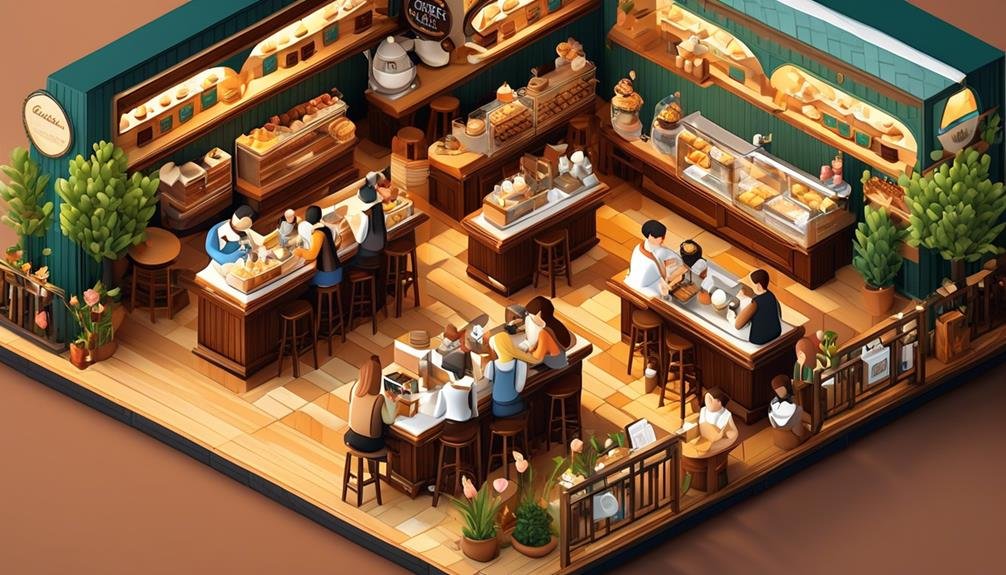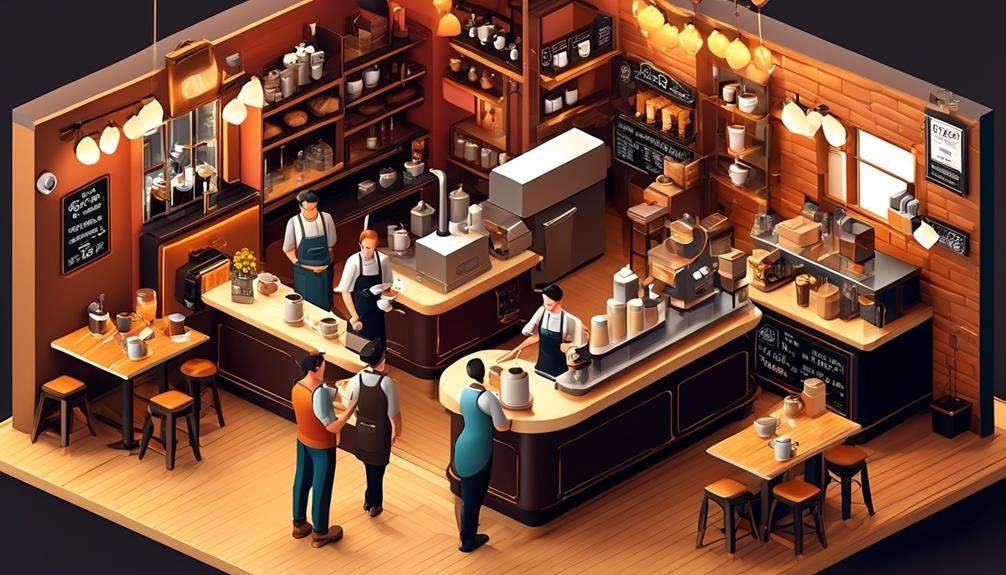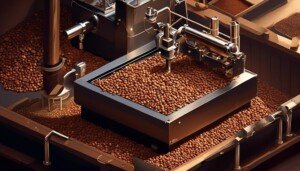Imagine yourself entering a bustling establishment, the aroma of freshly brewed coffee wafting through the air, as you find a cozy spot to settle in with your laptop or a good book.
You might wonder, what sets this place apart from the café you visited last week? What is the true difference between a coffee shop and a café?
The answer lies not only in the variety of food and drink options, but also in the atmosphere and overall experience they offer.
So, let's explore this intriguing distinction and uncover the unique characteristics that make each of these establishments a haven for coffee lovers and food enthusiasts alike.
Key Takeaways
- Coffee shops have a casual and individual-focused atmosphere, while cafés promote a sense of community and social interaction.
- Coffee shops primarily focus on specialty coffee drinks, while cafés offer a wider range of food choices, creating a dining experience.
- Coffee shops often have a minimalist design and prioritize the coffee, while cafés have a more sophisticated and cozy atmosphere with diverse seating options.
- Menu variety, creating a welcoming atmosphere, choosing an efficient POS system, and implementing contactless payment options are important factors for the success of both coffee shops and cafés.
Coffee Shop Vs. Café Atmosphere
When comparing the atmosphere of a coffee shop to that of a café, there are several key differences to consider.
In a coffee shop, you'll often find people sitting alone with their laptops or books, creating a more casual and individual-focused environment. On the other hand, cafés tend to be more social places where people gather in groups, promoting a sense of community and interaction.
The seating arrangements also differ between the two. Coffee shops usually offer a mix of comfortable chairs and tables, while cafés provide a variety of seating options, including free-standing tables and booths, encouraging customers to sit and stay for a longer duration.
Another significant difference lies in the menu offerings. Coffee shops prioritize their drink options, featuring a wide selection of specialty lattes and teas. While they may offer limited food choices, these are often prepared in advance. On the other hand, cafés provide a more extensive menu, including a variety of food options, ranging from light snacks to full meals. They aim to create a dining experience, where customers can enjoy a leisurely meal along with their beverages.
In terms of ordering, coffee shops typically have a counter where customers can place their orders, often opting for coffee to go. In contrast, cafés usually have waitstaff who take orders at the table, providing a more personalized and attentive service.
Menu Variations: Coffee Shop Vs. Café
As we shift our focus to the menu variations between a coffee shop and a café, it becomes evident that the offerings differ significantly in terms of both beverages and food options. Coffee shops primarily emphasize drink options, with a particular focus on specialty coffee drinks such as lattes and teas. On the other hand, cafes have a more balanced menu that includes a wider range of meals, like omelets and sandwiches.
To further illustrate the differences, let's take a look at a table that compares the menu variations between a coffee shop and a café:
| Coffee Shop | Café |
|---|---|
| Specialty coffee drinks | Balanced menu with a variety of meals |
| Limited food options | Wider range of food choices |
| Quick snacks or light meals | Seating for longer social interactions |
In coffee shops, you'll find an extensive drink menu, often with unique and creative specialty drinks that are hard to find elsewhere. The focus is more on providing a quick snack or light meal option, with limited food choices that are typically prepared in advance.
In contrast, cafes offer a more social setting, encouraging customers to stay longer and enjoy their meals. With a wider range of food options and a more extensive menu, cafes provide a space for longer social interactions, whether it's catching up with friends or working on your laptop.
Overall Experience: Coffee Shop Vs. Café

The overall experience at a coffee shop versus a café can greatly differ, with each offering a distinct atmosphere and ambiance for customers to enjoy.
When it comes to the overall experience, coffee shops tend to have a more casual and relaxed vibe. They often have a minimalist design, with simple furniture and a focus on the coffee itself. The atmosphere is usually buzzing with the sound of coffee being brewed and people chatting.
On the other hand, cafés offer a more sophisticated and cozy atmosphere. They often have a wider range of seating options, such as comfortable sofas and armchairs, creating a more intimate setting. The ambiance is usually quieter, with soft music playing in the background.
In terms of the food menu, coffee shops typically offer a limited selection of pastries and snacks, while cafés have a more extensive menu with options for breakfast, lunch, and even dinner. Additionally, coffee shops often specialize in serving a variety of specialty drinks, while cafés may focus more on providing a wider range of beverage options, including tea and alcoholic beverages.
When it comes to the customer experience, both coffee shops and cafés strive to provide excellent service, but the level of attention and personal interaction may vary. Coffee shops often have a more fast-paced environment, with customers placing their orders at the counter and then finding a seat on their own. In contrast, cafés tend to have table service, with waitstaff taking orders and bringing food and drinks directly to the table.
Lastly, the quality of coffee can also differ between coffee shops and cafés. Coffee shops often prioritize serving high-quality, specialty coffee sourced from specific regions or farms. On the other hand, cafés may focus more on providing a well-rounded coffee experience, offering a variety of blends and brewing methods.
Business Success: Coffee Shop and Café
To achieve business success in the competitive coffee industry, it's essential for both coffee shops and cafés to focus on key factors such as menu offerings, customer experience, and efficient POS systems. Here are some important considerations for running a successful coffee shop or café:
- Menu Variety: Offering a diverse range of coffee drinks and food options is crucial. Coffee shops should prioritize specialty lattes, teas, and other unique beverages, while cafés should emphasize a balanced menu with omelets, sandwiches, and salads.
- Customer Experience: Creating a welcoming and comfortable atmosphere is vital. Coffee shops should provide a casual and cozy environment, ideal for individuals looking for a place to work or relax. On the other hand, cafés should focus on creating a social setting with ample seating to encourage customers to sit and stay.
- Efficient POS System: Choosing the right point of sale (POS) system can significantly impact business operations. Look for features like barista cash drawer permissions, promotions, employee time management, advanced data reporting, and contactless payment options. KORONA POS is a great option that offers tailored solutions for both coffee shops and cafés.
- Quality of Work: Training and hiring skilled baristas and staff members is essential. Dedicate time and effort to ensure that your team is knowledgeable, friendly, and capable of delivering exceptional customer service.
- Word of Mouth: Positive word of mouth is a powerful tool for any business. Encourage your customers to share their positive experiences with others and consider implementing a loyalty program or referral system to incentivize repeat visits and recommendations.
Opening Your Own Coffee Shop or Café

If you're ready to take the next step towards business ownership in the coffee industry, it's time to explore the process of opening your own coffee shop or café. Before you begin, it's important to determine the concept you want to pursue.
A coffee shop typically focuses more on the drink options, such as various types of coffee and espresso-based beverages. On the other hand, a café places more emphasis on food options, offering a wider range of menu items like sandwiches, pastries, and salads.
Once you have decided on the concept, research the location and target demographic. Look for a venue with high foot traffic and popularity among your desired customer base. This will ensure a steady flow of customers to your shop or café.
Additionally, menu planning is crucial. If you're opening a coffee shop, source the best coffee beans and perfect your recipes for drinks. For a café, focus on creating delicious and diverse food options.
Don't forget to select the right POS system for efficient operations. This system will help with order processing, inventory management, and enhancing customer service.
Lastly, pay attention to the atmosphere and ambiance of your establishment. Design the space to reflect the chosen concept, whether it's a cozy and casual coffee shop or a more social and relaxed café setting. Consider the seating arrangements, lighting, and decor to create an inviting and comfortable environment for your customers.
Choosing the Right Hospitality POS System
When choosing the right hospitality POS system for your coffee shop or café, it's crucial to identify the specific features that align with your business needs. Here are five key factors to consider when selecting a POS system for your establishment:
- Barista cash drawer permissions: A good POS system should allow you to assign different cash drawer access levels to your staff, ensuring accountability and security.
- Promotions and discounts: Look for a POS system that offers flexible and easy-to-use promotion and discount features, allowing you to run promotions and attract customers without hassle.
- Employee time management: Consider a POS system that includes employee time tracking and management capabilities, making it easy to schedule shifts, track hours worked, and calculate payroll.
- Advanced data reporting: Opt for a POS system that provides detailed data reporting and analytics, allowing you to gain insights into sales trends, customer preferences, and inventory management.
- Contactless payment options: In today's world, it's essential to offer contactless payment options. Look for a POS system that supports various contactless payment methods, including mobile wallets and NFC-enabled cards.
Frequently Asked Questions
Do Americans Say Cafe or Coffee Shop?
Americans typically say "coffee shop" more often than "café." While these terms are often used interchangeably, coffee shops focus more on drink options, while cafés have a greater emphasis on food and offer a more upscale atmosphere.
What Makes a Cafe a Cafe?
A café is a place where you can enjoy a wide range of food options, including salads and sandwiches. It has a social atmosphere, perfect for longer stays with friends. The menu focuses on food, with options like omelets and sandwiches.
What Is a Small Cafe Called?
A small cafe is commonly referred to as a "coffee shop." It offers a cozy atmosphere with a focus on serving coffee drinks and light food options. It's a great place to relax and enjoy a cup of joe.
What Is the Legal Definition of a Coffee Shop?
A coffee shop is legally defined as an establishment that primarily serves coffee-based beverages and snacks. It differs from a café in that it typically has a more limited food menu and is focused on providing a quick and convenient experience.
Conclusion
In conclusion, understanding the difference between a coffee shop and a café is essential when considering opening your own establishment or choosing where to enjoy a drink or meal.
While coffee shops cater to individuals seeking a quick snack or a place to work alone, cafés provide a more social setting with a balanced menu of food and drink options.
By considering the atmosphere, menu variations, and overall experience, you can make an informed decision and create a successful business in the hospitality industry.




